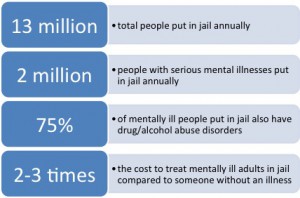
Data taken from the statement of Fred Osher, director at the Council of State Governments Justice Center, before the Senate Judiciary committee.
WASHINGTON – Better police training and specialized criminal justice procedures could cut down on the disproportionately high numbers of mentally ill people who wind up in the nation’s courts and jails, several criminal justice experts told a Senate committee Wednesday.
About 2 million people with serious mental illnesses are detained in jails in the U.S. each year and are more likely to land back in jail than members of the general public, Fred Osher, a director Council of State Governments justice center, said at a Judiciary Committee hearing.
There is evidence that certain practices can significantly help, such as training police to deal with mentally ill people and establishing rehousing programs, Osher said.
Bexar County, Texas, which includes San Antonio, has special training for police and the result has been reduced use of force in the arrests of the mentally ill, said Sheriff Susan Pamerleau. Before the training in 2009, officers had to use force, on average, 50 times annually in arresting mentally ill people; since then, force has only been used three times.
“The difference between 300 times and three times in six years is dramatic,” Pamerleau told the committee.
Police training targets first-response situations, where a mentally ill individual could be arrested through a misunderstanding when treatment would be a more appropriate solution, she said.
Law enforcement officers are taught to recognize people in a mental health crisis and to use de-escalation techniques to calm the situation. Arresting officers are also trained in ways of conversing with individuals to decide if a mental health professional is needed.
“That first brush with the law could have been turned into treatment as a condition of pretrial release, rather than being caught up in the criminal justice system multiple times,” Pamerleau said.
In the area of criminal justice reform, three counties in Minnesota have made changes to improve experiences for the mentally ill by creating mental health courts. These courts are voluntary and specialized for mental health, providing services such as counseling, intensive probation supervision and employment and housing assistance.
But the procedure has limitations. The court in Ramsey County, which includes St. Paul, can work with about 40 cases at a time, said William Ward, a state public defender in Minnesota.
“We know what works,” Ward said. “We need to take the necessary resources to get what works off the ground.”
“Truly a lot of what we’re talking about is keeping people from entering the court system,” he said.
In Texas, Bexar County also has a mental health court, which has reduced recidivism rates of mentally ill people by 17 percent, compared to those not in the program, Pamerleau said.
Housing and employment programs could also help mentally ill people released from jail avoid returning, she said. In Bexar County, about 60 percent of mentally ill inmates had been in and out of jail at least a half-dozen times.
“This is an issue that affects everyone,” Pamerleau said. “Everyone has a story of a friend or family member who suffers from mental illness.”


